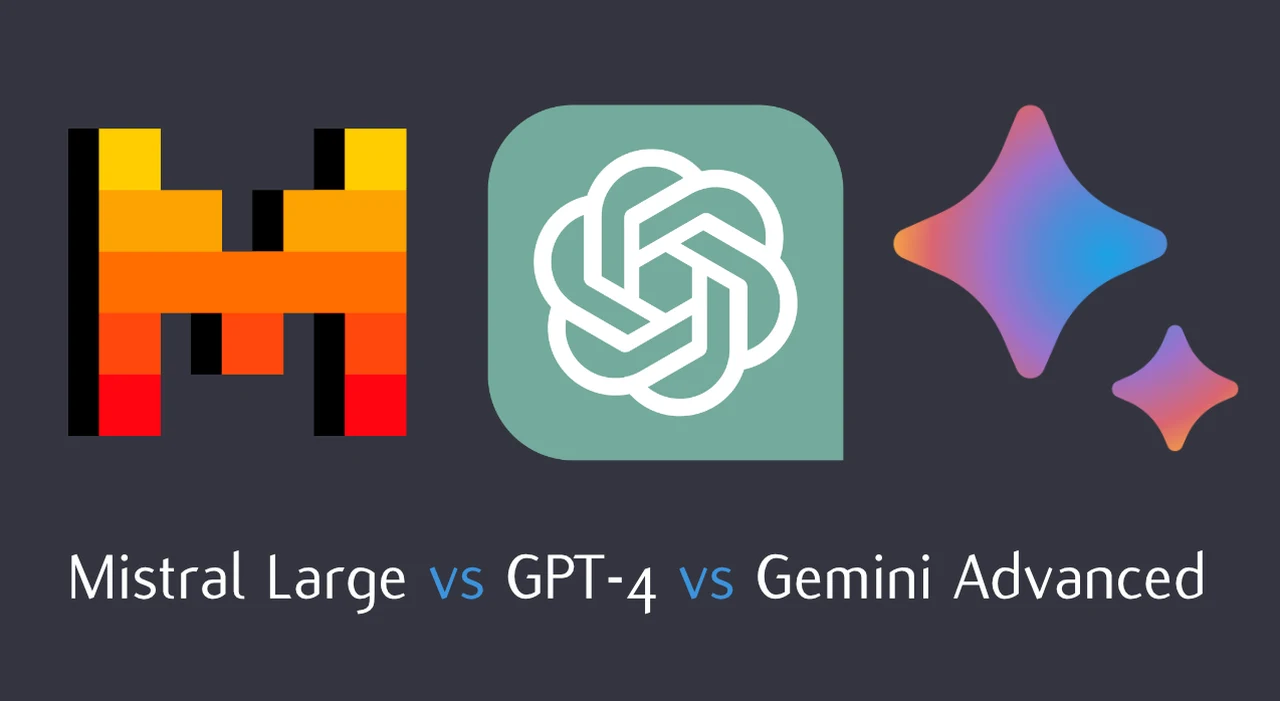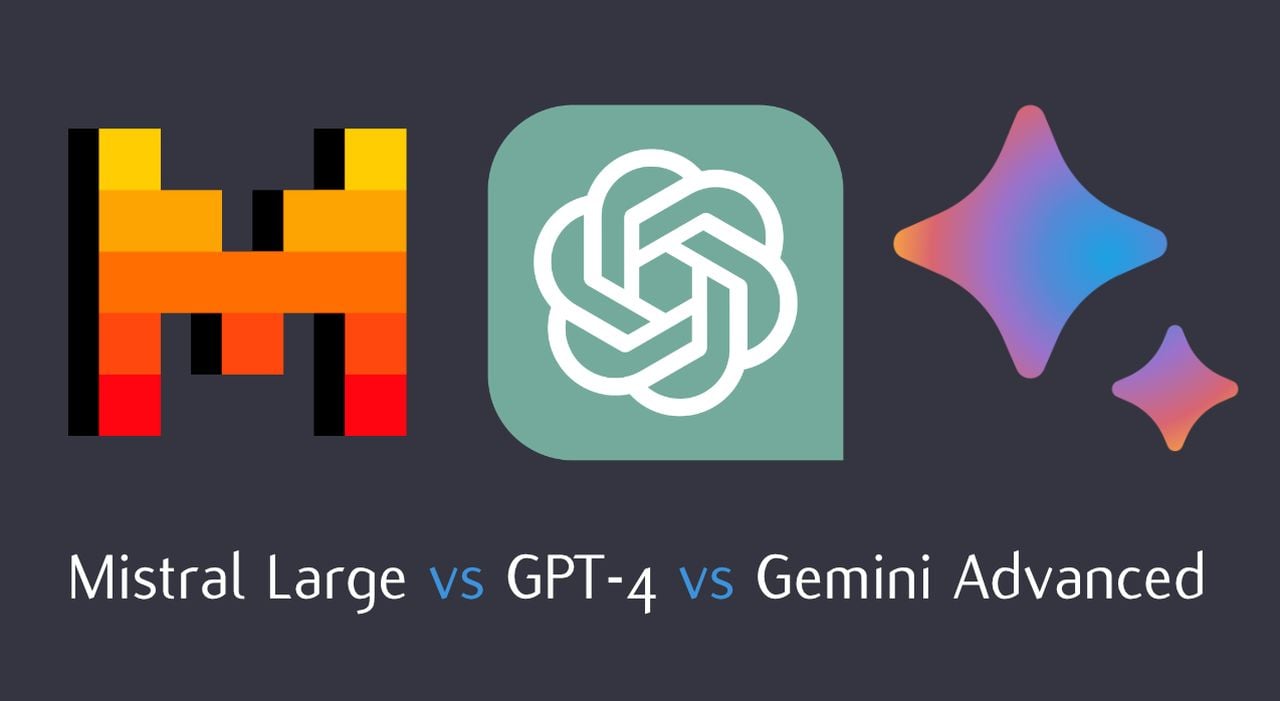
Mistral AI has recently unveil its latest large language model in the form of Mistral Large providing another step towards AGI or Artificial General Intelligence. Language models like Mistral Large, GPT-4, and Gemini Advanced are at the forefront, reshaping our understanding of how machines can mimic human communication. These advanced systems are designed to generate text that is strikingly similar to human writing, and they are becoming increasingly sophisticated. However, despite their advancements, these models have distinct capabilities and limitations this quick guide will provide more insight into the differences between Mistral Large vs GPT-4 vs Gemini Advanced.
Mistral Large and GPT-4 are particularly adept at tasks that require an understanding of common sense and the ability to provide truthful answers. They support multiple languages, especially European ones, which makes them versatile tools in global communication. Mistral Large stands out with its ability to handle large chunks of text, thanks to its 32k context window. This feature is especially useful for complex mathematical reasoning, where the ability to process extensive information is crucial.
Despite these strengths, Mistral Large’s development has taken a turn that may limit its potential. Its creators have decided to move away from the open-source model, which means that users who want to tweak or improve the system may find themselves at a disadvantage. This is a significant shift from the collaborative spirit that has typically driven AI advancements.
Mistral Large vs GPT-4 vs Gemini Advanced
When put to the test, these models were evaluated across various domains, including basic reasoning, creativity, math, and coding. Mistral Large and GPT-4 performed impressively in basic reasoning tasks. However, Gemini Advanced revealed some shortcomings in this area, suggesting that its logical processing could use some improvement.
The creativity tests were revealing. GPT-4 demonstrated a remarkable ability to craft coherent stories from even the most bizarre prompts, surpassing Gemini Advanced, which had difficulty generating similar quality content. This indicates that GPT-4 may be better suited for tasks that require a high degree of inventiveness and adaptability.
Here are some other articles you may find of interest on the subject of large language models :
In the performance testing carried out by Goyashy AI mathematical problems were another area of assessment. All models managed to solve the problems presented to them, but Gemini Advanced tended to skip the reasoning steps. This is a significant drawback for contexts where understanding the process is as important as the answer, such as in educational settings or when clarity is required.
Coding challenges brought another layer of differentiation. GPT-4 and Gemini Advanced were both able to write Python code for a simple game, but Mistral Large struggled with this task. This suggests that Mistral Large might not be the best choice for those looking to use AI for programming-related projects.
An interesting test involved asking the models to write a biography for an insect with a very short lifespan. Mistral Large and GPT-4 produced relevant content, but there were inaccuracies that pointed to a need for improvements in generating narratives that are specific to the context.
Overall, Mistral Large shines in mathematical reasoning and can handle large amounts of text, but it falls short in programming tasks and its accessibility has been reduced. GPT-4 is a strong contender in creative and coding challenges, while Gemini Advanced needs to work on its logical reasoning and ability to explain its processes.
Exploring Advanced AI Language Models
In the fast-paced world of artificial intelligence, language models such as Mistral Large, GPT-4, and Gemini Advanced are revolutionizing the way we think about machine-based communication. These sophisticated systems are engineered to produce text that is strikingly similar to human writing, pushing the boundaries of what artificial intelligence can achieve. As these models evolve, they exhibit unique strengths and weaknesses that set them apart from one another.
Mistral Large and GPT-4 excel in areas that demand an innate sense of common sense and the capacity to deliver truthful answers. Their multilingual support, particularly for European languages, renders them invaluable in international discourse. Mistral Large’s notable feature is its 32k context window, which allows it to manage extensive passages of text effectively. This capability is particularly beneficial for complex mathematical reasoning, where processing a vast array of information is essential.
However, Mistral Large’s trajectory has shifted in a way that could restrict its future potential. Its developers have chosen to move away from the open-source model, potentially hindering those who wish to modify or enhance the system. This change represents a departure from the collaborative ethos that has traditionally propelled the progress of AI technology.
Comparative Performance of AI Language Models
In comparative evaluations, these models were tested across different fields, including basic reasoning, creativity, math, and coding. Mistral Large and GPT-4 showed impressive results in basic reasoning exercises. However, Gemini Advanced exhibited weaknesses in this domain, indicating that its logical processing might require refinement.
The creativity tests were quite telling. GPT-4’s ability to generate cohesive narratives from unusual prompts outshone Gemini Advanced, which struggled to produce content of comparable quality. This suggests that GPT-4 is more adept at tasks demanding a high level of inventiveness and adaptability.
In the realm of mathematics, all models were capable of solving the problems posed to them, but Gemini Advanced often omitted the reasoning steps. This is a notable disadvantage in situations where understanding the methodology is as crucial as the solution itself, such as in educational settings or when detailed explanations are necessary.
When faced with coding challenges, GPT-4 and Gemini Advanced could both script Python code for a simple game, but Mistral Large had difficulties with this task. This indicates that Mistral Large may not be the optimal choice for those seeking to leverage AI for programming-related projects.
An intriguing experiment involved requesting the models to compose a biography for an insect with a brief lifespan. Mistral Large and GPT-4 generated pertinent content, yet there were inaccuracies that highlighted the need for enhancements in creating narratives that are specific to the context.
In summary, Mistral Large excels in mathematical reasoning and handling voluminous text but is less suitable for programming tasks and has become less accessible. GPT-4 stands out in creative and coding challenges, while Gemini Advanced must improve its logical reasoning and process explanation capabilities.
Filed Under: Guides, Top News
Latest timeswonderful Deals
Disclosure: Some of our articles include affiliate links. If you buy something through one of these links, timeswonderful may earn an affiliate commission. Learn about our Disclosure Policy.

